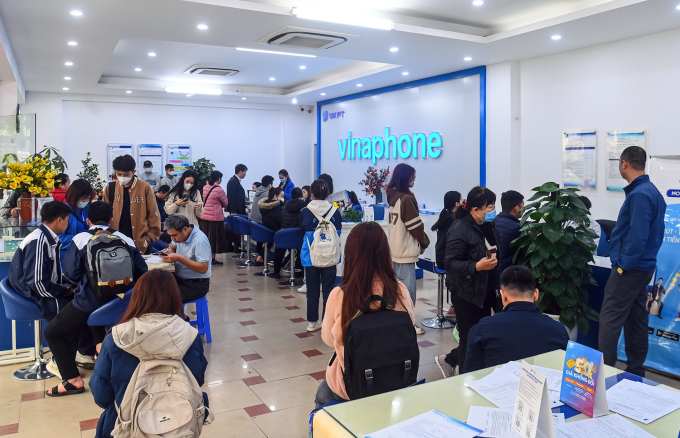Edition: International | Vietnamese
© Copyright 1997 VnExpress.net. All rights reserved.
Dang Quang of Hanoi said he had not used his prepaid VinaPhone number ending in "999 999" for a while since he was away on business trips. When he attempted to use the number in November this year, he found it had been revoked. The account also had a balance of VND3 million.
On Nov. 20 Quang visited a VinaPhone service center, where he was informed that the number had been assigned to a new customer and could not be retrieved. Unhappy with VinaPhone’s response, he raised the issue on social media on Dec. 8.
"I have used my SIM for 15 years, along with several other VinaPhone numbers, and it is certainly not a disposable one," he wrote. "These numbers are linked to my bank and online accounts, so losing any of them poses significant risks and inconveniences."
 |
|
Customers at a VinaPhone store in Hanoi. Photo by VnExpress/Luu Quy |
His post included a statement from VinaPhone, which claimed that the revocation complied with regulations. The issue has sparked debate online, with some agreeing that the company acted within its rights while others accusing it of "exploiting opportunities to revoke and resell high-value SIM cards for profit."
In Vietnam, SIM cards with six identical digits in sequence are highly sought after. On SIM trading platforms, "six-nines" SIM cards are priced between VND1.7 billion and VND6.9 billion, depending on the carrier and prefix.
Van Nam, who has a number ending with five identical digits, said: "Premium SIM cards are not just for communication; they are valuable assets and often attract malicious attention. Therefore, network providers should offer more support." Owning a premium number often involves stricter procedures than for regular ones. For instance, while switching to eSIM or porting numbers can typically be done online, premium number users must visit service centers in person and undergo multiple verification steps to ensure ownership.
Some argued that premium phone numbers are sold at higher prices and should come with additional support, but others blamed Quang for not following regulations. A user named The Tam commented: "No matter how valuable it is, a SIM card is a SIM card. Users must read and understand the instructions and regulations instead of expecting special treatment."
VinaPhone said on Dec. 9 that the revocation adhered to regulations set by the Ministry of Information and Communications, which have been publicly enforced for years. "This process optimises the allocation of telecommunications resources and reduces the prevalence of disposable SIM cards." Before deactivation, network providers send warning messages. Once deactivated, numbers remain in the system for 30 days with an additional 15 days for reactivation if requested. After this grace period the numbers are resold.
VinaPhone said Quang’s number was deactivated both ways on Aug. 29 and remained inactive until Oct. 12, 45 days later. Warnings of deactivation were sent on Aug. 14, 16, 18, 24, 26, and 28, it said. "After sending the notifications, we received no response from the customer, and the number did not generate any telecom activity." The number was sold to another customer on Nov. 19, it said.
It is contemplating legal action against false and defamatory claims related to the case, saying they could harm its reputation.